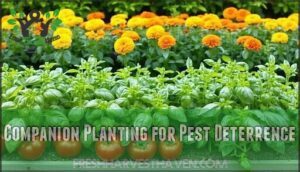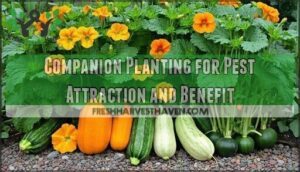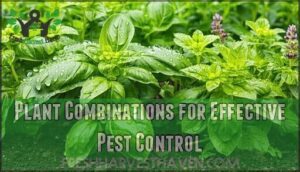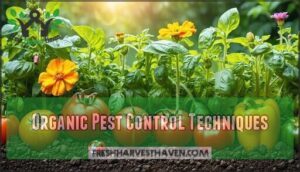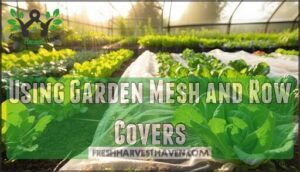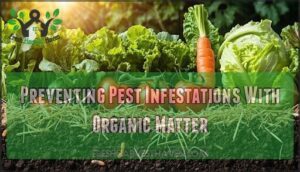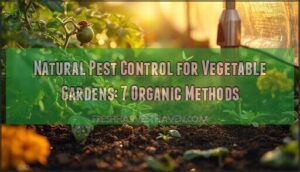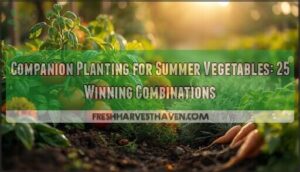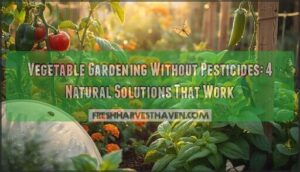This site is supported by our readers. We may earn a commission, at no cost to you, if you purchase through links.
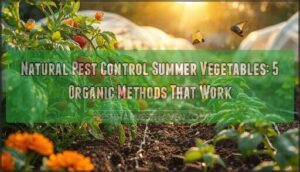
Start with companion planting—marigolds repel aphids while basil deters tomato hornworms.
Release ladybugs and lacewings to devour soft-bodied pests, or spray neem oil for broader protection.
Physical barriers like row covers create an impenetrable fortress against flying invaders.
Diatomaceous earth sprinkled around plants cuts through crawling insects like microscopic glass.
These methods work because they target pest vulnerabilities while strengthening your garden’s natural defenses.
The real magic happens when you combine multiple strategies into a pest-fighting system that works around the clock.
Table Of Contents
- Key Takeaways
- Natural Pest Control Methods
- Companion Planting Strategies
- Organic Pest Control Techniques
- Physical Barriers and Prevention
- Enhancing Garden Health
- Frequently Asked Questions (FAQs)
- How do you control pests in a vegetable garden?
- What is the best pest control for a vegetable garden?
- Are there pests in a vegetable garden?
- How do you get rid of pests naturally?
- Why should you use natural pesticides in your vegetable garden?
- Which pest control oil should I use for my vegetable garden?
- What is the best homemade pesticide for vegetable gardens?
- How do you keep bugs off vegetables naturally?
- Is vinegar a natural bug repellent for vegetable plants?
- Is it possible to grow vegetables without pesticides?
- Conclusion
Key Takeaways
- You’ll protect your vegetables naturally by combining companion planting with beneficial insects—marigolds repel aphids while ladybugs devour soft-bodied pests for an 80% reduction in damage.
- You can create physical barriers using row covers and diatomaceous earth that work 24/7, blocking flying invaders while microscopic particles cut through crawling insects without harming beneficial organisms.
- You’ll strengthen your plants’ natural defenses through proper soil health with compost, organic fertilizers, and beneficial microorganisms that boost immunity and make vegetables naturally pest-resistant.
- You can use targeted organic sprays like neem oil and essential oil mixtures that disrupt pest lifecycles without chemical residues, achieving 92% aphid control while preserving garden ecosystem balance.
Natural Pest Control Methods
You’ll discover that natural pest control methods protect your summer vegetables without harmful chemicals while supporting beneficial insects and soil health.
These science-backed approaches include biological agents, plant-based oils, mineral treatments, and microbial solutions that work with nature’s own pest management systems, utilizing biological agents to maintain a healthy balance.
Biological Agents for Pest Control
When battling garden pests, you’ll find biological control agents are nature’s own security team.
Predator introduction brings lady beetles and green lacewings that devour aphids, while parasitoid wasps target caterpillars from within.
Beneficial nematodes hunt soil-dwelling grubs, and beneficial insects work alongside microbial pesticides to create effective natural pest control without chemicals.
You can easily purchase these pest control options for your garden.
Natural Insecticides and Plant-Based Oils
Natural insecticides like Neem Oil and Pyrethrum Extract offer targeted pest control for summer vegetables.
Neem Oil disrupts insect lifecycles, reducing feeding by 80% in field trials. Pyrethrum Extract causes rapid paralysis in soft-bodied pests with 92% aphid control rates.
Essential Oils containing fatty acids create effective barriers against common garden invaders. Neem oil products are widely available.
These plant-based pesticides break down quickly, maintaining organic status while protecting crops, which is a key benefit of using natural insecticides like Neem Oil and Pyrethrum Extract.
Mineral-Based Options for Pest Control
Diatomaceous Earth serves as your first line of defense against crawling pests in summer vegetables.
This fossilized algae creates microscopic cuts in soft-bodied insects while remaining safe for beneficial organisms.
Horticultural oils suffocate aphids and spider mites on contact.
Clay applications and silica amendments improve soil structure while deterring root-feeding pests through improved drainage and mineral content.
To enhance effectiveness, consider planting trap crops to draw pests away from your vegetables, using Diatomaceous Earth and horticultural oils as part of a broader strategy, including silica amendments and trap crops.
Microbial Control and Its Applications
Microscopic allies work harder than you’d think in your garden.
Bacterial pesticides like Bacillus thuringiensis target specific pest larvae without harming beneficial insects.
Fungal control agents such as Beauveria bassiana infect aphids and whiteflies naturally.
Viral insecticides offer targeted pest management for caterpillars.
These soil microbes create probiotic effects that strengthen plant immunity.
Natural remedies using microbial control provide sustainable pest management for vegetable garden pests through organic pest control methods.
Companion Planting Strategies
You’ll discover that certain plants naturally repel pests while others attract beneficial insects that hunt down garden troublemakers.
Strategic companion planting transforms your vegetable garden into a self-protecting ecosystem where plants work together to maintain healthy, pest-free growing conditions.
Companion Planting for Pest Deterrence
Three smart plant pairings create powerful pest deterrence in your summer garden.
Aromatic repellents like basil and marigolds confuse insects with their strong scents, while intercropping benefits emerge when you plant these companions between vulnerable vegetables.
Trap cropping uses decoy plants to lure pests away from your prized tomatoes and peppers, making companion planting your garden’s natural bodyguard system.
Companion Planting for Pest Attraction and Benefit
Garden companions work double duty when they lure pests away from your prized vegetables.
Smart companion planting creates decoy gardens that protect your main crops while building beneficial insect habitat.
Strategic companion planting for pest attraction:
- Trap Cropping – Plant nasturtiums near squash to draw cucumber beetles away from valuable crops
- Pollinator Gardens – Establish flower borders with marigolds and zinnias for natural pest management through biodiversity boost
- Habitat Creation – Use sacrificial plants like radishes to attract flea beetles while attracting beneficials
Plant Combinations for Effective Pest Control
Beyond basic pairing tactics, strategic plant combinations create powerful pest-fighting teams.
Combining repellent pairings with trap cropping maximizes protection—while marigolds shield tomatoes, nearby radishes draw threats away.
Attractant combinations like nasturtiums near lettuce create decoy zones.
Camouflage planting disrupts pest navigation patterns effectively.
For example, basil and oregano offer complementary pest control.
| Combination Type | Plants Used | Pest Reduction |
|---|---|---|
| Repellent Pairings | Basil + Peppers | 62% thrips damage |
| Trap Cropping | Blue Hubbard + Zucchini | 73% vine borer cuts |
| Disruptive Planting | Mixed 5+ species | 55% overall pests |
Organic Pest Control Techniques
You can protect your summer vegetables from pests using organic techniques that work with nature’s own systems.
These methods focus on strengthening your plants’ natural defenses while creating an environment that discourages harmful insects and diseases, using techniques that work with nature’s own systems.
Pruning and Clearing Infested Areas
Regular pruning techniques prevent summer garden pests from establishing colonies in your vegetable garden.
You’ll need to assess infestation severity before cutting, then sterilize tools between plants to avoid spreading diseases.
Remove damaged stems and leaves immediately—proper waste disposal means composting healthy material only.
Clean cuts help plant recovery while eliminating pest breeding sites through effective organic gardening practices.
Nourishing Plants With Compost and Organic Fertilizers
Healthy soil creates resilient plants that naturally resist pest attacks.
Compost benefits your vegetable garden by improving soil structure and nutrient cycling, while organic fertilizer provides essential plant nutrition.
These natural solutions boost garden health through enhanced soil biology and beneficial microorganisms.
Well-nourished organic vegetables develop stronger immune systems, making your organic gardening efforts more successful against summer pest pressure, thanks to improved soil structure and essential plant nutrition.
Inviting Natural Predators Into The Garden
Well-fed plants resist pests better, but attracting natural predators provides additional protection.
Create habitats that welcome beneficial insects, birds, and other pest-eating creatures to your garden. Incorporate bee conservation features and butterfly habitats to support integrated pest management strategies effectively.
- Predator Habitats: Build log piles and stone borders for ground beetles and spiders
- Water Sources: Install shallow dishes or birdbaths for beneficial insects and birds
- Shelter Creation: Plant dense shrubs where predators can hide between hunting sessions
- Attracting Birds: Set up nesting boxes to boost populations of insect-eating songbirds
Monitoring and Managing Pest Pressure
Effective pest identification helps you spot problems before they spiral out of control.
Check your plants weekly for signs of damage, unusual spots, or tiny insects hiding under leaves.
When pest populations reach pressure thresholds that threaten your harvest, targeted intervention becomes necessary.
Early detection allows you to implement natural pest control methods like beneficial predator release or organic sprays.
Understanding population dynamics helps you predict when garden insect control measures will be most effective for vegetable pest control success.
Physical Barriers and Prevention
You can create physical barriers that stop pests before they reach your summer vegetables, saving you from reactive treatments later.
These preventive measures work around the clock, forming your garden’s first line of defense against crawling insects, flying pests, and soil-dwelling threats, and are a key part of preventive measures.
Using Garden Mesh and Row Covers
Through strategic placement of mesh materials and row covers, you’ll create an invisible fortress around your summer vegetables.
These lightweight barriers provide pest exclusion while maintaining proper airflow and light penetration.
Installation techniques involve securing fabric edges with soil or clips, creating microclimate creation benefits.
Row cover benefits include protection from flying insects, while allowing beneficial pollinators access when removed during flowering periods.
Many gardeners find suitable mesh covers essential for plant protection.
Creating a Protective Environment for Plants
Beyond mesh and row covers, you’ll want to establish beneficial habitats that support natural pest control throughout your summer vegetables.
Proper plant spacing improves air circulation, reducing disease pressure and creating unfavorable conditions for many pests.
Strategic water management prevents moisture-loving insects from establishing colonies.
Maintaining excellent soil health through organic amendments strengthens your plants’ natural defenses.
Consider incorporating insect repellent plants like marigolds between your vegetables to create protective zones that discourage harmful insects naturally, using natural pest control and improving overall air circulation.
Preventing Pest Infestations With Organic Matter
Organic matter acts as your garden’s security system against unwanted pests.
Here’s how to fortify your vegetable garden with natural pest control materials:
- Layer thick compost around plants to improve soil health and deter ground-dwelling insects
- Apply organic mulch like straw or wood chips to disrupt pest life cycles
- Monitor decomposition rates to maintain ideal nutrient cycling without attracting harmful organisms
- Choose high compost quality materials that won’t harbor pest eggs or larvae
- Rotate mulch types seasonally to confuse pest patterns and boost natural remedies effectiveness
Crop Rotation and Its Importance
Moving beyond organic matter, you’ll find crop rotation stands as your garden’s strategic defense system.
Switching vegetable families annually breaks pest cycles that reduce populations by 80%.
This natural pest control method disrupts soil-dwelling insects and pathogens while improving soil health through nutrient cycling.
Your rotating schedule prevents weed buildup and boosts yield improvement, creating stronger pest management strategies for long-term vegetable garden care success, which relies on effective pest management.
Enhancing Garden Health
A healthy garden naturally resists pest damage better than stressed plants struggling with poor growing conditions.
You’ll create the strongest defense against summer vegetable pests by maintaining ideal soil nutrition, consistent watering schedules, and proper light exposure for each crop’s specific needs, which will help in creating a strong defense against pests and maintaining a healthy garden.
Ensuring Adequate Water, Light, and Nutrients
Healthy vegetables resist pests naturally when they receive proper care.
Strong plants develop robust immune systems that deter harmful insects while attracting beneficial ones.
- Watering Techniques: Deep, infrequent irrigation promotes strong root development and prevents moisture stress that attracts pests.
- Light Exposure: Six to eight hours of direct sunlight daily strengthens plant cell walls and enhances natural deterrents.
- Nutrient Balance: Balanced soil amendments prevent deficiency symptoms that make plants vulnerable to insect damage.
Regular Fertilization With Organic Options
Regular organic fertilizer application strengthens plants naturally, boosting their pest resistance through improved nutrition.
You’ll want to feed summer vegetables every 2-3 weeks with compost tea or fish emulsion, which delivers slow-release nutrients while enhancing soil microbe activity.
These natural garden solutions cost less than synthetic options and create robust, chemical-free growing conditions that support your organic gardening goals effectively, using methods like fish emulsion.
Adding Compost and Beneficial Microorganisms
Beyond regular fertilization, compost introduces beneficial microorganisms that create thriving soil ecosystems.
These compost microbes establish a robust soil foodweb, enhancing mycorrhizal benefits for stronger plant immunity against pests.
- Vermicompost tea provides concentrated microbial diversity for weekly applications
- Aged compost releases slow nutrients while boosting beneficial bacteria populations
- Mycorrhizal inoculants form symbiotic relationships, improving nutrient uptake and natural pest resistance
This microbial foundation supports natural gardening principles.
Optimizing Soil Conditions for Plant Growth
Soil pH determines nutrient availability for your summer vegetables, while proper soil structure enhances water retention and microbial life.
You’ll want slightly acidic to neutral conditions (6.0-7.0 pH) for ideal pest management in organic gardening.
Well-draining loam supports natural pest control by strengthening plant immunity.
Test your vegetable garden’s pH annually and amend with lime or sulfur as needed.
Adding organic matter improves soil structure and fertility.
Frequently Asked Questions (FAQs)
How do you control pests in a vegetable garden?
Persistent pests plaguing your plants? You’ll eliminate garden invaders by encouraging beneficial insects, applying companion planting techniques, and using organic sprays like neem oil. Hand-picking larger pests works effectively too.
What is the best pest control for a vegetable garden?
You’ll achieve best results combining companion planting, beneficial insects, and organic sprays.
Plant marigolds, basil, and nasturtiums to repel pests naturally.
Encourage ladybugs and parasitic wasps while using neem oil for stubborn infestations.
Are there pests in a vegetable garden?
Picture tiny invaders marching through your carefully tended rows—yes, you’ll definitely encounter pests in your vegetable garden.
Aphids, caterpillars, beetles, and spider mites commonly target tomatoes, peppers, lettuce, and other crops, making pest management essential for healthy harvests.
How do you get rid of pests naturally?
You’ll eliminate garden pests using companion plants, beneficial insects, and organic sprays.
Try neem oil, diatomaceous earth, or soapy water solutions.
Encourage ladybugs and birds while rotating crops to disrupt pest cycles naturally.
Why should you use natural pesticides in your vegetable garden?
Coincidentally, when ladybugs arrive in your garden, they’re nature’s pest control army.
You’ll protect beneficial insects, avoid chemical residues on food, and maintain soil health naturally.
Synthetic pesticides kill indiscriminately, disrupting ecosystems you’ve worked to balance, using synthetic pesticides can be particularly harmful, and it’s better to have nature’s pest control.
Which pest control oil should I use for my vegetable garden?
You’ll want neem oil for your summer vegetables since it’s gentle yet effective against aphids, whiteflies, and mites.
This botanical extract won’t harm beneficial insects when applied properly, making it your garden’s best friend for natural pest management.
What is the best homemade pesticide for vegetable gardens?
Neem oil spray stands as your garden’s gentle guardian against unwanted invaders.
You’ll create an effective homemade pesticide by mixing two tablespoons of neem oil with one tablespoon of mild dish soap per gallon of water, targeting soft-bodied insects while preserving beneficial pollinators naturally.
How do you keep bugs off vegetables naturally?
You can deter bugs by handpicking pests, encouraging ladybugs, using row covers, and spraying diluted soap or garlic water.
Rotate crops, keep weeds down, and mulch well—think of it as building a bug-proof fortress.
Is vinegar a natural bug repellent for vegetable plants?
Vinegar works as a natural bug deterrent for your vegetable plants, though it’s more effective against soft-bodied insects like aphids than harder pests.
You’ll need to reapply frequently since rain washes it away quickly.
Is it possible to grow vegetables without pesticides?
Yes, you can absolutely grow vegetables without pesticides.
Many successful gardeners rely on companion planting, beneficial insects, crop rotation, and organic amendments to maintain healthy plants that naturally resist pests and diseases, using methods like crop rotation.
Conclusion
You’ve planted the seeds of success by mastering natural pest control summer vegetables protection.
These five organic methods—biological agents, companion planting, physical barriers, natural oils, and garden health optimization—work together like a well-oiled machine.
You’ll notice fewer pest problems while supporting beneficial insects that keep your ecosystem thriving.
Your vegetables will thank you with healthier growth and better yields all season long, which is a result of garden health optimization.

